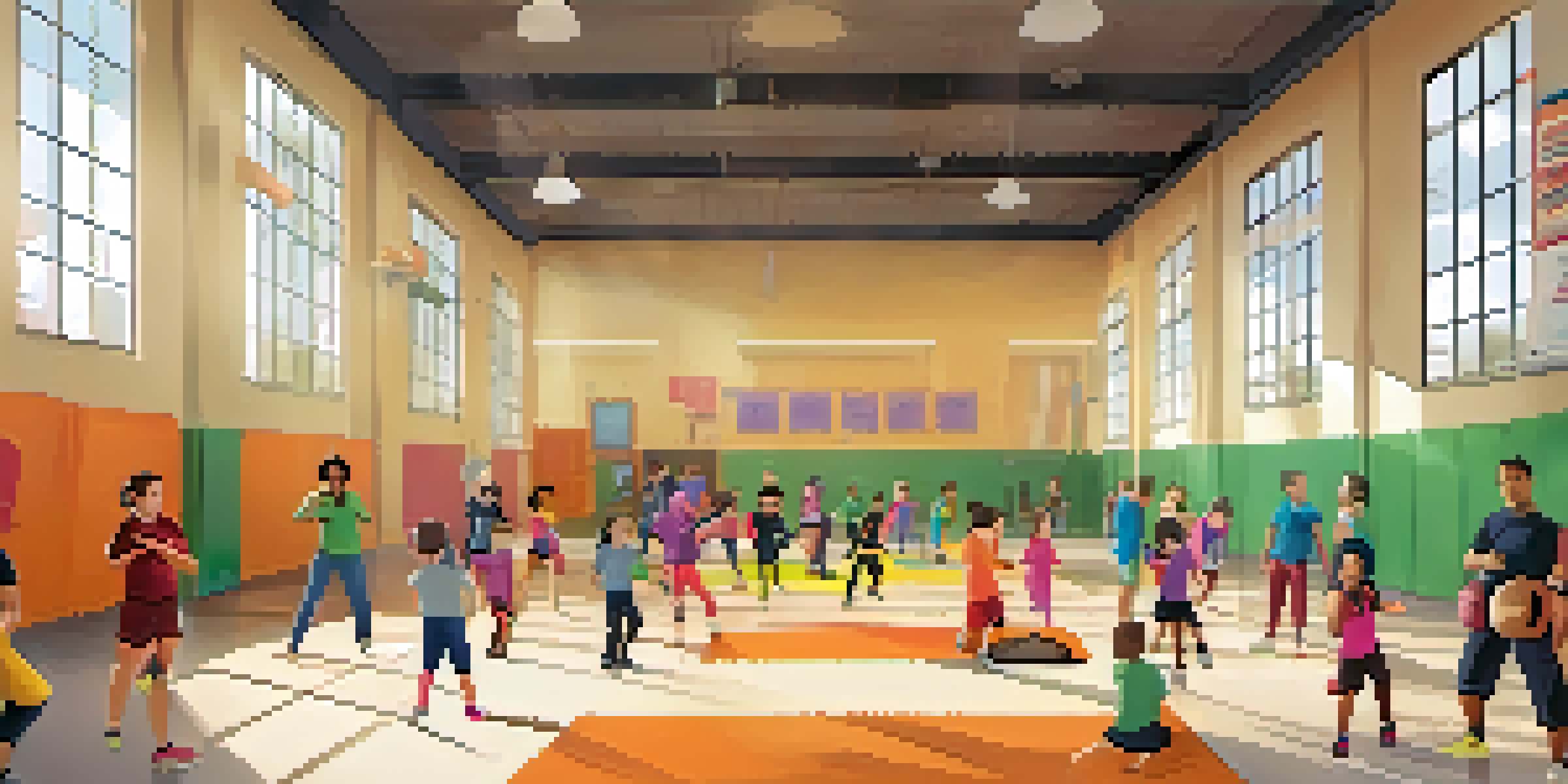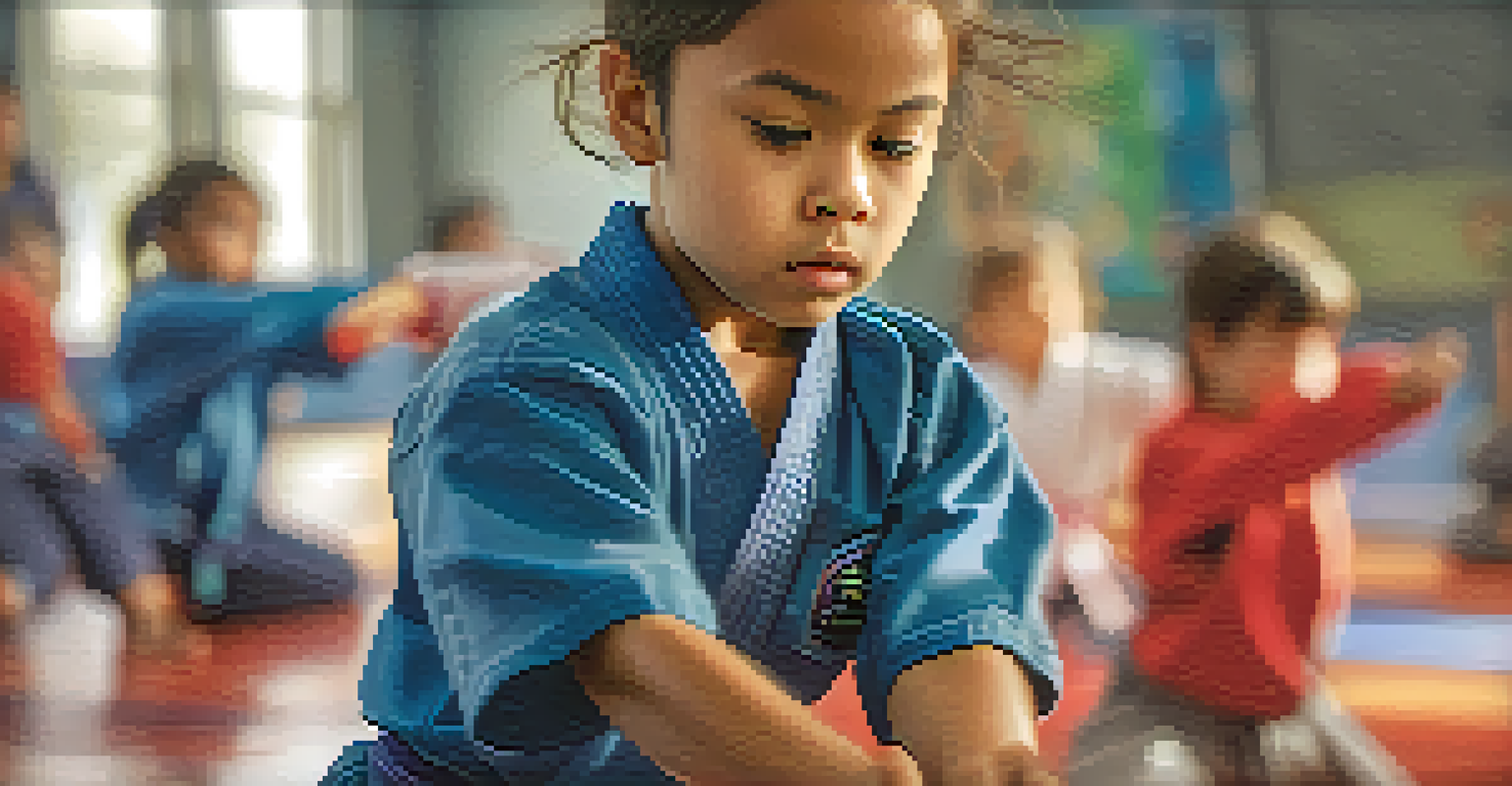Interactive Workshops: Engaging Kids in Self Defense Training

The Importance of Self-Defense Training for Kids
Self-defense training is crucial for kids as it not only teaches them how to protect themselves, but also instills confidence. Many children face bullying or unsafe situations, and knowing how to respond can empower them greatly. By learning self-defense, kids gain a sense of control over their environment, fostering resilience and self-esteem.
Self-defense is not just about fighting back; it's about being able to stand tall and face the world with confidence.
Moreover, these skills extend beyond physical defense. Self-defense training often emphasizes situational awareness and the importance of making smart choices, which are essential life skills. This holistic approach helps children understand their surroundings better, potentially avoiding dangerous scenarios altogether.
In essence, self-defense is not just about combat; it's about teaching children to navigate the world safely. Equipping them with these skills can lead to a more confident and secure generation, ready to face challenges head-on.
How Interactive Workshops Enhance Learning
Interactive workshops are a fantastic way to engage kids in self-defense training, transforming learning into a fun experience. Instead of passive listening, children actively participate, practicing techniques and engaging in role-playing scenarios. This hands-on approach not only makes the training more memorable but also reinforces skills through repetition.

Additionally, interactive workshops often incorporate games and challenges, which keep the kids excited and motivated. By turning learning into a playful activity, children are more likely to absorb the information and apply it in real-life situations. This element of fun is essential in maintaining their interest and enthusiasm.
Empower Kids with Self-Defense Skills
Self-defense training boosts children's confidence and equips them with essential skills to navigate potentially unsafe situations.
Ultimately, the interactive nature of these workshops fosters a supportive community among the participants. Kids learn from each other while developing friendships, which can be incredibly beneficial for their social skills and emotional development.
Key Components of an Effective Workshop
An effective self-defense workshop for kids should include a mix of fundamental techniques and situational practice. It's important to cover basic moves like escapes, stances, and defensive postures, ensuring that kids have a solid foundation. Instructors should focus on age-appropriate techniques, making sure that every child can grasp and execute the moves safely.
The best defense is a good offense, but the best offense is knowing how to protect yourself.
Another critical element is the incorporation of real-life scenarios where children can apply what they've learned. This might involve mock situations that simulate potential threats, allowing kids to practice their responses under guidance. By familiarizing them with different scenarios, they are better prepared to handle real-life situations calmly and effectively.
Lastly, creating a positive and encouraging atmosphere is vital. Instructors should emphasize personal growth and safety rather than aggression, making sure kids understand that self-defense is about protection, not violence.
Building Confidence Through Practice
Regular practice is essential for building confidence in self-defense skills. Just like learning to ride a bike, the more kids practice, the more natural it becomes. Workshops should encourage repetition of techniques, allowing children to master their movements and feel assured in their abilities.
As they progress, kids will not only improve their physical skills but also their mental resilience. Each successful practice session helps reinforce their belief in themselves, leading to a stronger, more confident mindset. This newfound confidence can positively impact other areas of their lives, from school to social interactions.
Interactive Workshops Make Learning Fun
Engaging in hands-on workshops keeps kids motivated and fosters a supportive community while reinforcing self-defense techniques.
Ultimately, the journey of learning self-defense is as much about personal growth as it is about physical skills. With each practice, kids learn to trust themselves, which is an invaluable lesson that extends far beyond the training mat.
Incorporating Fun Activities into Training
To keep kids engaged, incorporating fun activities into self-defense training is essential. For instance, games like 'red light, green light' can be adapted to teach movement and reaction skills. By adding a playful element, children remain enthusiastic about their training while developing critical skills.
Another effective strategy is using obstacle courses that challenge kids to navigate through various scenarios. This not only adds an element of excitement but also encourages teamwork and communication among participants. They learn to rely on each other, building camaraderie and trust.
Incorporating fun into self-defense training ensures that kids enjoy the process, increasing the likelihood that they will continue learning and practicing. When training feels like play, children are more likely to develop a lifelong interest in self-defense.
The Role of Instructors in Workshops
Instructors play a pivotal role in the success of self-defense workshops. A great instructor not only possesses expertise in self-defense techniques but also has the ability to connect with children. They should create a welcoming environment where kids feel safe to ask questions and express themselves.
Moreover, effective instructors adapt their teaching styles to match the needs of their students. They recognize that each child learns differently and may need different levels of support. By being patient and encouraging, instructors can help all kids progress at their own pace.
Long-Term Benefits Beyond Techniques
Self-defense training instills discipline, respect, and resilience in children, contributing to their overall physical fitness and personal growth.
Ultimately, a knowledgeable and approachable instructor can inspire a love for self-defense in children, setting them on a path of continuous learning and growth. Their guidance can make all the difference in a child's self-defense journey.
The Long-Term Benefits of Self-Defense Training
The benefits of self-defense training extend far beyond the immediate skills learned in workshops. As children engage in these activities, they develop critical life skills such as discipline, focus, and respect for themselves and others. These traits are invaluable as they navigate through various challenges in life.
Moreover, self-defense training can contribute to better physical fitness. Kids who participate in these workshops often become more active, leading to improved health and well-being. The combination of physical activity and self-defense training can cultivate a lifelong appreciation for fitness.

In the long run, the confidence and skills gained from self-defense training can empower children to face life's challenges with resilience. They learn that they can protect themselves, advocate for their own safety, and build positive relationships with peers.